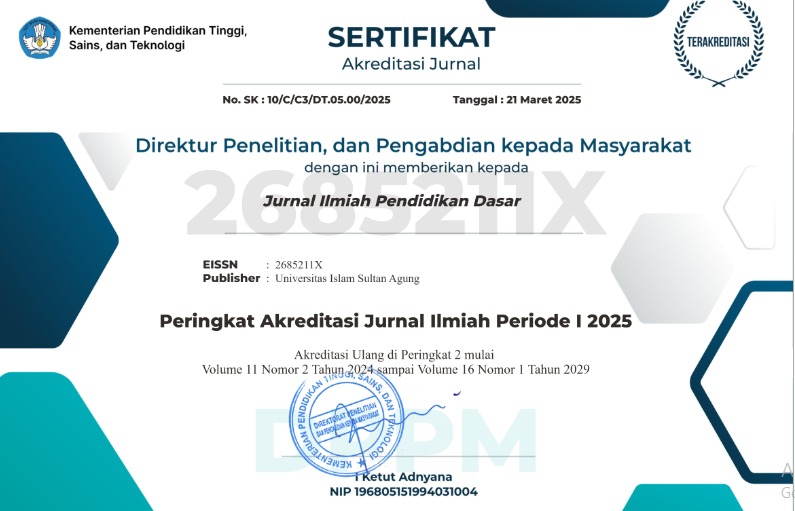Developing digital teaching module with problem-based learning integrated to virtual lab on electricity
Abstract
Keywords
Full Text:
PDFReferences
Agustina, D. W., & Fitrihidajati, H. (2020). Pengembangan Flipbook Berbasis Problem Based Learning (PBL) pada Submateri Pencemaran Lingkungan untuk Melatihkan Keterampilan Berpikir Kritis Peserta Didik Kelas X SMA. Berkala Ilmiah Pendidikan Biologi (BioEdu), 9(2), 325–339.
Alfiah, S., & Dwikoranto, D. (2022). Penerapan model problem based learning berbantuan laboratorium virtual PhET untuk meningkatkan HOTs siswa SMA. Jurnal Penelitian Pembelajaran Fisika, 13(1), 9–18.
Amelia, R. (2023). Need Analysis of Integrated Science Digital Teaching Materials with Blended Learning Models in the New Normal Era for PGMI Students throughout East Java. Al Ibtida: Jurnal Pendidikan Guru MI, 10(1), 29–41.
Arista, F. S., & Kuswanto, H. (2018). Virtual Physics Laboratory Application Based on the Android Smartphone to Improve Learning Independence and Conceptual Understanding. International Journal of Instruction, 11(1), 1–16.
Cahyaningtyas, A. P., & Ismiyanti, Y. (2022). Pelatihan Pembuatan Flipbook Interaktif Bagi Guru-Guru SD Negeri Desa Gentansari dan Twelagiri. BERNAS: Jurnal Pengabdian Kepada Masyarakat, 3(4), 1112–1119.
Devi, P. S., & Bayu, G. W. (2020). Berpikir Kritis dan Hasil Belajar IPA Melalui Pembelajaran Problem Based Learning Berbantuan Media Visual. Mimbar PGSD Undiksha, 8(2), 238–252.
Endaryati, S. A., Atmojo, I. R. W., St Y, S., & Suryandari, K. C. (2021). Analisis E-Modul Flipbook Berbasis Problem Based Learning untuk Memberdayakan Keterampilan Berpikir Kritis Pembelajaran IPA Sekolah Dasar. DWIJA CENDEKIA: Jurnal Riset Pedagogik, 5(2), 300–312.
Gulo, A. (2022). Penerapan Model Pembelajaran Problem Based Learning Dalam Meningkatkan Motivasi Dan Hasil Belajar IPA. Educativo: Jurnal Pendidikan, 1(1), 334–341.
Handayani, W., Setiawan, W., Sinaga, P., & Suhandi, A. (2017). Kesulitan mahasiswa calon guru fisika dalam merepresentasikan konsep listrik magnet. Journal of Teaching and Learning Physics, 2(2), 21–29.
Hartati, R. (2016). Peningkatan aspek sikap literasi sains siswa SMP melalui penerapan model problem based learning pada pembelajaran IPA terpadu. Edusains, 8(1), 90–97.
Ismail, A., Festiana, I., Hartini, T. I., Yusal, Y., & Malik, A. (2019). Enhancing students’ conceptual understanding of electricity using learning media-based augmented reality. Journal of Physics: Conference Series, 1157(3), 032049.
Ismiyanti, Y., & Cahyaningtyas, A. P. (2019). Pengembangan Bahan Ajar Mata Kuliah Praktikum IPS SD Pengaruhnya Terhadap Prestasi Belajar. Jurnal Ilmiah Pendidikan Dasar, 6(1), 1–10.
Ismiyanti, Y., Permatasari, D., Mayasari, N., & Qoni’ah, M. (2023). The Impact of Video Based Learning to Cognitive Learning Outcome of Student in Elementary School. JIP (Jurnal Ilmiah PGMI), 9(1), 51–59.
Kimianti, F., & Prasetyo, Z. K. (2019). Pengembangan e-modul ipa berbasis problem based learning untuk meningkatkan literasi sains siswa. Kwangsan: Jurnal Teknologi Pendidikan, 7(2), 91–103.
Kurniawati, Y., & Fatisa, Y. (2016). Evaluasi program pemodelan dan simulasi laboratorium kimia pada mahasiswa calon guru. Edusains, 8(2), 201–211.
Mardetini, E., & Amrina, D. E. (2019). Pengembangan Buku Ajar Analisis Laporan Keuangan Berbasis Problem Based Learning. Jurnal Ekonomi Pendidikan dan Kewirausahaan, 7(2), 111–128.
Maulidiana, L. N., Cahyaningtyas, A. P., & Ismiyanti, Y. (2021). Development of digital interactive module “E-MOSI”(Elektronik Modul Puisi) for grade IV students of elementary school of Kemala Bhayangkari 02. EduBasic Journal: Jurnal Pendidikan Dasar, 3(2), 137–148.
Medriati, R. (2003). Upaya Peningkatan Hasil Belajar Fisika Siswa Pada Konsep Cahaya Kelas VII6 Melalui Penerapan Model Pembelajaran Problem Based Learning (PBL) Berbasis Laboratorium di SMPN 14 Kota Bengkulu. Prosiding SEMIRATA 2013, 1(1).
Nofitasari, I., & Sihombing, Y. (2017). Deskripsi kesulitan belajar peserta didik dan faktor penyebabnya dalam memahami materi listrik dinamis kelas X SMA Negeri 2 Bengkayang. Jurnal Penelitian Fisika dan Aplikasinya (JPFA), 7(1), 44–53.
Pramana, M. W. A., Jampel, I. N., & Pudjawan, K. (2020). Meningkatkan hasil belajar biologi melalui e-modul berbasis problem based learning. Jurnal Edutech Undiksha, 8(2), 17–32.
Savitri, S., Araina, E., Fahrina, R., Nurhanisha, U., & Yantie, S. (2022). Pengembangan bahan ajar digital problem based learning (PBL) untuk meningkatkan pemahaman konsep pada mata kuliah zoologi vertebrata. Edu Sains: Jurnal Pendidikan Sains dan Matematika, 10(1), 77–84.
Setyoko, S., Indriaty, I., & Atmaja, T. H. W. (2019). Efektifitas Bahan Ajar Ekologi Hewan Berbasis Problem Based Learning Terhadap Kemampuan Berpikir Kritis Dan Pemecahan Masalah Mahasiswa Pendidikan Biologi. BIOEDUKASI (Jurnal Pendidikan Biologi), 10(2), 133–139.
Siswanto, J. (2016). Kesulitan mahasiswa dalam representasi konsep rangkaian listrik. MATHEMATICS AND SCIENCES FORUM II 2016.
Solikhin, F., Ikhsan, J., & Sugiyarto, K. H. (2019). A need analysis in developing virtual laboratory according to the chemistry teachers. Journal of Physics: Conference Series, 1156(1), 012020.
Suari, N. P. (2018). Penerapan model pembelajaran problem based Learning untuk meningkatkan motivasi belajar IPA. Jurnal Ilmiah Sekolah Dasar, 2(3), 241–247.
Sukma, R. R., Ismiyanti, Y., & Ulia, N. (2022). Pengaruh Blended Learning dengan model Flipped Classroom berbantuan video terhadap hasil belajar kognitif kompetensi IPA kelas V. Jurnal Ilmiah Pendidikan Dasar, 9(2), 142–156.
DOI: https://dx.doi.org/10.30659/pendas.11.1.50-68
Refbacks
- There are currently no refbacks.
Copyright (c) 2024 Jurnal Ilmiah Pendidikan Dasar

This work is licensed under a Creative Commons - Attribution-NonCommercial-ShareAlike 4.0 International License.
Jurnal Ilmiah Pendidikan Dasar is published by Elementary School Teacher Education (PGSD), Faculty of Teacher Training and Education (FKIP), Universitas Islam Sultan Agung, in collaboration with Asosiasi Doktor Pendidikan Dasar Indonesia.
Contact us: FKIP Unissula Jl. Raya Kaligawe Km.4 Terboyo Kulon, Genuk, Semarang 50112. Email: jurnalpendas@unissula.ac.id










